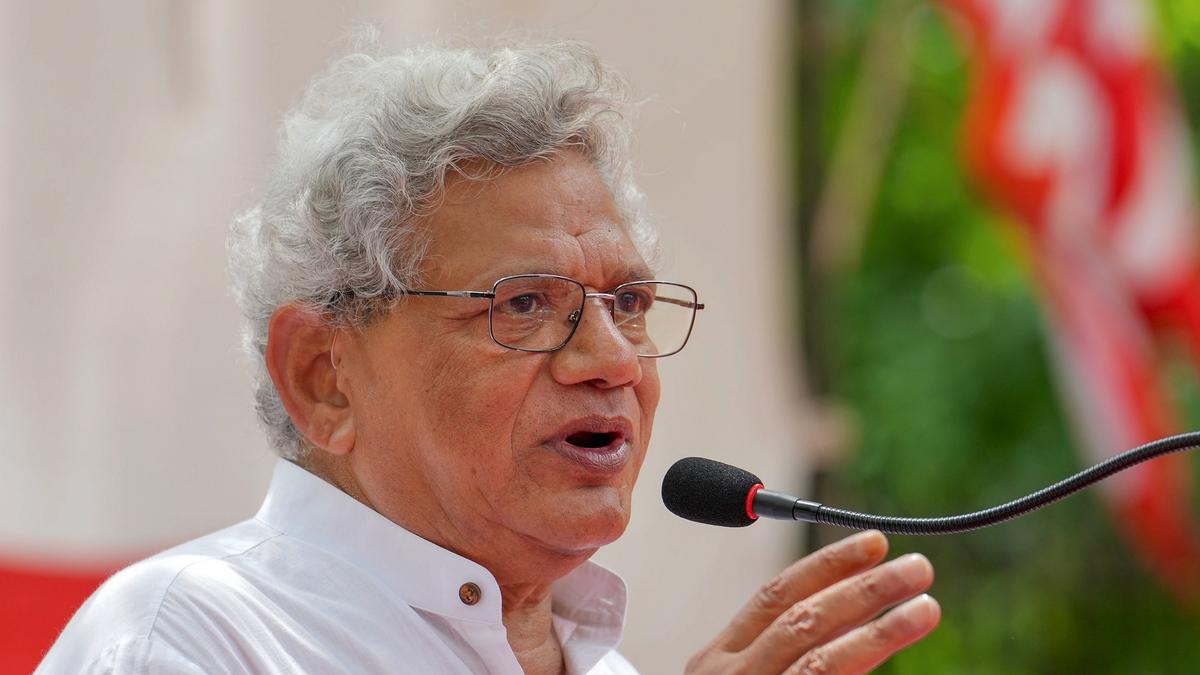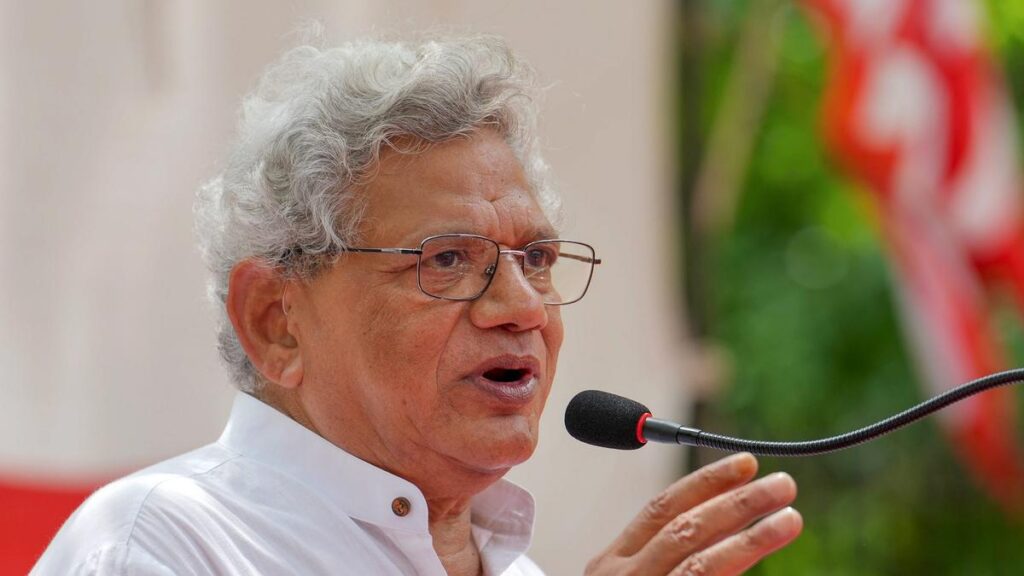

The Communist Party of India (Marxist) general secretary Sitaram Yechury, who passed away on Thursday, September 12 after a fatal bout of respiratory illness at the age of 72, has left a deep void just not in the leadership of the CPI(M), but also in the functioning of the INDIA bloc, that has been fighting effectively the BJP and the Prime Minister Narendra Modi-led NDA government at the Centre for the last three years.
Sitaram took over the position of the general secretary of the CPI(M) in 2015 and would have completed his third term by the time the 24th party congress takes place in Madurai in April 2025. As per party norms, he would have laid down his office, facilitating the process of nomination of a new general secretary. This is routine in the CPI(M)’s organisational affairs.
But Sitaram was not just the CPI(M) general secretary of the last nine years; he was also an ideologue and strategist who helped the process of consolidation of secular and democratic forces against the BJP under Narendra Modi’s rule, and his counsel was widely accepted by the non-BJP opposition parties, especially the Congress under Sonia Gandhi, and now under LoP Rahul Gandhi.
Narendra Modi era began in 2014 and Sitaram’s CPI(M) general secretaryship began in 2015. The communalisation of the Indian polity and the devaluing the autonomy of the constitutionally-mandated institutions continued in the first term of PM Narendra Modi. The process intensified after the big BJP victory in 2019 Lok Sabha elections. The opposition parties saw the danger to democracy and the constitution, and decided to join forces and formed the INDIA bloc. It was not an easy task and Sitaram contributed a lot in making it possible, despite being the general secretary of a party which won only three seats in Lok Sabha in the 2019 elections.
This was possible only because of his unorthodox nature in dealing with the leaders of the opposition parties, unlike many CPI(M) leaders with rigid position and his capacity to make friends across various political parties. Sonia Gandhi, during her Congress presidency, discussed with Sitaram key issues of national importance, and now Rahul Gandhi himself admits that he has been ideologically benefitted through discussions with Sitaram.
Sitaram was an expert in writing the common minimum programme. He did a big job first in 1996 before the formation of the Deve Gowda-led government supported by the Congress from outside. The drafting committee included P Chidambaram and Sitaram. PC was then in the Tamil Maanila Congress. He was tipped to be the Finance Minister of the Deve Gowda government. But the CMP had a major stamp of Sitaram’s pro-people ideas. Chidambaram was virtually overruled and the CMP was finalised.
I still remember, as the Business Editor of Hindustan Times, at that time, I talked to Sitaram and reported the CMP contents in HT. Next morning, I got a call from my Editorial Director and owner Shobhana Bhartia that Chidambaram was upset. He said that he was not properly reported, the story was biased in favour of Sitaram’s views. “You talk to Chidambaram. And report his views as well,” Mrs. Bhartia said. I spoke to his office. He himself told me he would get back later, but he did not get back. Next day, officially the CMP was out and my report proved correct. There was no word from PC, thereafter.
After the 2004 Lok Sabha elections, CPI(M) general secretary Harkishan Singh Surjeet moved fast in extending Left support to the UPA government. Sitaram played a role in working on the CMP again. Sonia Gandhi was impressed with his understanding on the economic and social issues facing the country. That relationship stayed till the last despite many irritants at the party level. During the 2008 July crisis in the UPA government, both Prime Minister Dr. Manmohan Singh and Sonia Gandhi sought Sitaram’s help in overcoming it, but Sitaram, as a loyal party member, stuck to the CPI(M) position on withdrawal of support from the Government, though he personally was against withdrawal at the central committee meeting.
CPI(M) had its finest hour after the 2004 Lok Sabha elections. The decline began nationally from 2009 Lok Sabha elections. From 43 in 2004, the Lok Sabha tally came down to 16 in 2009, 9 in 2014 and to 3 in 2019 elections. The tally in 2024 Lok Sabha elections was 4 out of which 3 seats — two from Tamil Nadu and one from Rajasthan — are more due to alliance support than CPI(M)’s own strength. Only one seat from Kerala is solely on the basis of CPI(M)’s strength. The CPI(M)’s vote share in the 2024 Lok Sabha elections was just 1.76 per cent. Sitaram, despite his wide visibility and big influence over the INDIA bloc, could not halt the downslide in CPI(M) that began after 2009 Lok Sabha elections.
On a personal level, my relationship with Sitaram began in 1996. Mostly the discussions were limited to political issues. But in 1999, at the platinum jubilee celebrations of Hindustan Times at Taj Palace Hotel, I met a different Sitaram. He was attending the reception party. It was a conglomeration of VIPs of Delhi. We three, Sitaram, A N Sen (Badshah) and myself gossiped at one corner of the hall for more than two hours over all the issues in the world, excepting politics. I saw a no-holds-barred Sitaram and it was a typical Bengali adda. I never knew that Sitaram could churn out so many jokes in different languages!
I must mention one incident. During my HT days, I had a few one-on-one sessions with the chairman cum owner K K Birla at his residence in Tis January Lane. In one such meeting, he suggested that HT in its business page should invite economists of differing views. I told him that it would be better to use them in the HT editorial page. He agreed. I gave him four names out of which two would be selected. Those were Dr. Arjun Sengupta, Sitaram Yechury, Dr. Kamal Nayan Kabra and Dr. Girish Mishra. After some discussions, we zeroed in on two names Dr. Arjun Sengupta and Sitaram Yechury. Both wrote their columns in HT for a long time. In fact readers looked with big interest to read Sita’s column in HT which was lucid, reader friendly and at the same focused on urgent issues of the day.
Now what next for the CPI(M)? The party leadership will choose an acting general secretary who will look after the work till the April party congress, when it will elect the new general secretary for the next three years. Sitaram’s democratic approach has helped in improving the perception about the CPI(M) in national politics. Sitaram has cultivated good relations with the CPI and the CPI(ML) Liberation, which has two seats in Lok Sabha now and both on the basis of its strength in Bihar. Now the Left has a total tally of eight as against the tally of five in 2019 elections. There has to be a consolidation of left forces followed by expansion. The 24th party congress must focus on this as also on exploring the possibility of the unity of the communist movement at organizational level also, in which Sitaram believed.
With the demise of Sitaram, the relationship with the Congress, especially Rahul Gandhi, may not remain the same. It was not a party to party relationship. It was a relationship between two steadfast political individuals. That stature is lacking in the potential CPI(M) general secretaries. Politburo member Brinda Karat has that national status, but she will be 77 next month. If the CPI(M) follows the rule of retiring leaders above 75, her name may not be considered. But, at the present stage of national politics, she can be considered as a special case. In major European and Latin American communist parties, women leaders at leading positions are doing exceedingly well. M A Baby of Kerala is another politburo member who has the qualities of making friends across the political parties. He is 70, well below the age ceiling. He can be considered also.
Finally, the CPI(M) has to drastically revise its party programme. The party leaders have to recognise the new ground realities in the Indian polity and adapt the policies in the programme accordingly. Sixty years have passed since its founding in 1964; that is too long a time for a party to stick to more or less the same programme. Sitaram would have certainly fought for revision in the 24th party congress. Well-wishers of the Left movement hope that Sitaram’s vision about the CPI(M) as a formidable part of INDIA bloc fighting shoulder to shoulder with the Congress and other opposition parties, is carried forward by the CPI(M) party delegates at the Madurai congress in April 2025. (IPA Service)



